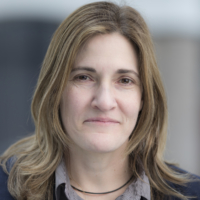Exploring new frontiers in energy
As a little girl, Iliana Portugues dreamed of travelling to space, as a grown-up she’s kept her feet on the ground as Head of UK and National Grid Ventures Innovation. But every day is still an adventure, as she helps to ignite the next revolution in the clean energy sector.
I worked my way through lots of different dream jobs as a child, from a farmer, to a Greenpeace activist and a vet. But the last one I had before I started my real career was space. I didn’t want to be an astronaut – I didn’t fancy wearing one of those suits – I was more thinking Star Wars or Star Trek. It was my interest in space that inspired my degree. I’m short and at the time you had to be over 1m 60cm to go into space, but I realised they would always need people to fix things, so I got a Masters in Electronics and Communication Engineering from the University of Bath.
Despite my dreams of space, I think it was clear from the beginning that I would end up working in energy instead. At the end of my studies I was scheduled to go to Geneva for an interview with CERN, but at the same time I was asked to help out with a gassing transformer in London to help keep the lights on – to me that seemed like the bigger priority and I never made it to Switzerland.
After my Masters, I went on to get a PhD from Bath, which focused on helping to detect defective equipment and issues by making picking up radio signals from high-voltage equipment simpler. At the time, this was done by people walking around substations with radios, but I developed new antennas and processing algorithms to analyse the signals, using neural networks and AI to determine the issue. After I finished my PhD, I set up a business selling the system I’d developed and National Grid was my biggest customer.
It’s not enough to just put a woman on the board and think you have diversity, you need to get a real mix of cultures and backgrounds to deliver the fresh ideas and innovation we need.
I kept in touch with the company over the years and, in 2015, I was offered a full-time job; so, I sold my company and joined National Grid. What appealed to me was that it’s one of the few organisations in the world where you can really get to understand the future of energy and its impact on society. The breadth of knowledge of its technical staff, capability and technology that National Grid delivers was a huge attraction.
Kickstarting the next energy revolution
I’m glad I made that decision, as I’m now one of those lucky people who never dreads going to work in the morning. What I find truly exciting right now is working with National Grid and the wider energy ecosystem in the UK to make a real difference. For example, we’re working with the Royal Academy of Engineering Entrepreneurship Hub to develop a range of start-up hubs around the country focused on energy and sustainability. The idea is to drive more companies to get involved in the energy sector in the UK, widening the focus outside London, helping us drive the next revolution in clean energy. It’s so fulfilling to work on something that marries society, the environment, energy and job creation.
International Women’s Day is a chance to reflect on what women can bring to an industry like this. And, in an area like innovation, it’s all about getting different ideas and perspectives. It’s great to see more female role models like Baroness Brown, chair of the Committee on Climate Change, who I met at an event recently. What really impressed me was how she politely refused to let any of the men in the room interrupt our conversation. But it’s not enough to just put a woman on the board and think you have diversity, you need to get a real mix of cultures and backgrounds to deliver the fresh ideas and innovation we need.
Get dirty and holding someone’s life in your hands
It’s a great time to join the energy industry and for any young women considering engineering as a career I’d give them three pieces of advice. One: get dirty early on – you need to get experience of what it’s like having someone’s life in your hands and you can only get that on site. Two: think about the wider picture – energy is a national issue and you need to understand how it impacts people, the country and the environment. And, three: look outwards, not inwards – build international relationships as energy is a global issue and friends around the world can be useful when you hit up against a tough challenge.

